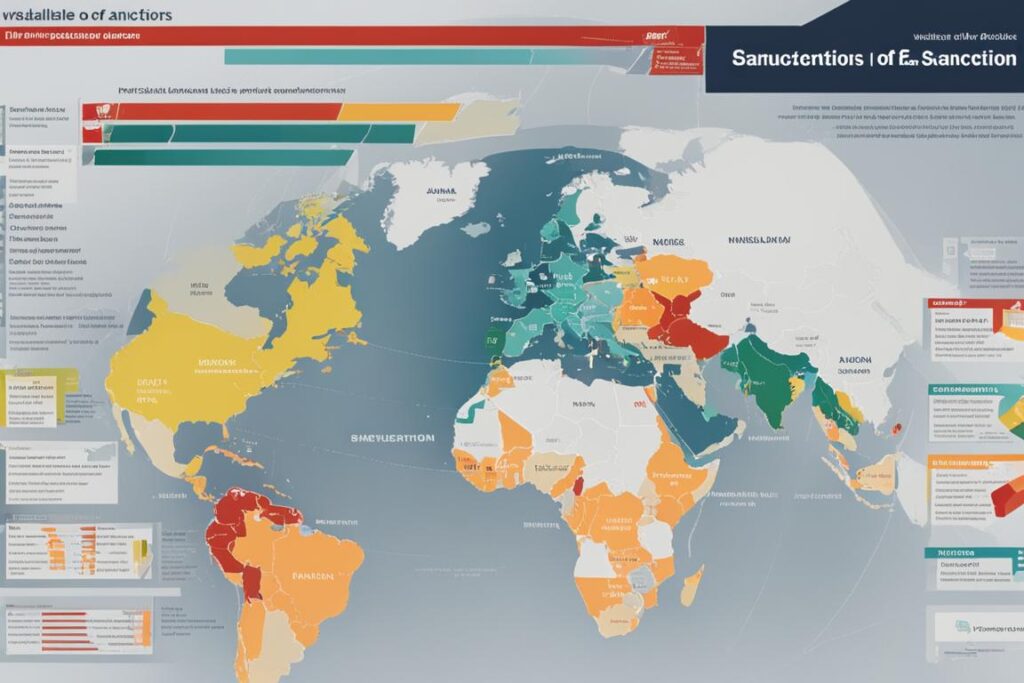Welcome to our comprehensive guide on sanctions, where we will explore the meaning and purpose of these measures that shape global affairs. Sanctions are a powerful tool that nations and international organizations use to promote change and respond to violations of international law. But what are sanctions, exactly? In this guide, we will define the term and explore the different types of sanctions, including economic sanctions, international sanctions, and targeted sanctions. We will examine how the United Nations and the United States approach sanctions, analyze their effectiveness and limitations, and look at real-world examples of their impact on political, economic, and social dynamics between countries. Let’s delve into the world of sanctions and discover their meaning together!
Defining Sanctions: A Closer Look at Their Meaning and Purpose
In the world of international relations, the term “sanctions” is frequently used, but what exactly do they mean? Sanctions refer to any measure taken by a country or group of countries to restrict or prohibit certain activities or transactions with another country or entity. They can take various forms, including economic, trade, diplomatic, or military actions.
The purpose of sanctions is to pressure a country or entity to change its behavior, policy, or activities, usually for violating international norms, human rights, or security agreements. Sanctions are thus a non-violent means of addressing international conflicts that seek to avoid military action, reduce harm to civilians, and promote dialogue.
Sanctions may be imposed unilaterally by a single country or multilaterally by a group of countries or international organizations, such as the United Nations. The severity and scope of sanctions may vary depending on the specific situation and the intended goals. Now that we have defined what sanctions are and why they are used, let’s explore the different types of sanctions in the next section.
Unveiling Different Types of Sanctions
Sanctions comprise a range of measures employed by governments and international organizations to restrict or compel actions by foreign entities, individuals, or countries. Various types of sanctions exist, each designed to address specific issues and achieve varying goals:
| Type of Sanctions |
Description |
Examples |
| Economic Sanctions |
Restrict or prohibit trade or investment with targeted countries or entities. |
U.S. embargo on Cuba, EU sanctions on Russia |
| International Sanctions |
Imposed by international organizations, such as the UN, and designed to address global issues. |
UN sanctions on North Korea, Iran |
| Targeted Sanctions |
Restrict or ban targeted individuals’ or entities’ financial transactions, travel, or access to resources. |
U.S. sanctions on Venezuelan officials, Russian oligarchs |
Economic sanctions, being the most commonly used, have proven effective in achieving their intended goals, including ending apartheid in South Africa and pressuring Iran to negotiate its nuclear program. International sanctions have similarly contributed to global efforts in curbing nuclear proliferation and addressing human rights abuses. Targeted sanctions are useful in influencing specific behaviors within a country, such as pressuring governments to democratize or respect human rights.

Overall, the different types of sanctions provide a diverse toolbox for governments and organizations to address a wide range of issues on the global stage.
The Role of the United Nations in Imposing Sanctions
When it comes to imposing international sanctions, the United Nations plays a crucial role in promoting peace, security, and stability around the world. The UN Security Council is authorized to impose sanctions on countries that pose a threat to international peace and security. The purpose of these sanctions is to encourage these countries to change their behavior and comply with international law. United Nations sanctions can take various forms and can target specific individuals or entities engaged in illegal activities.
While the United Nations plays a vital role in enforcing international sanctions, it is important to note that the success of these efforts is not guaranteed. Sanctions can be ineffective or counterproductive if not implemented correctly. That is why the UN takes a careful, measured approach to imposing sanctions, consulting with member states and taking into account the potential impact on civilians and vulnerable populations.
International sanctions are a powerful tool that can have significant impacts on global affairs. By working together through the United Nations to enforce sanctions, the international community can send a strong message to rogue states and entities that illegal activities will not be tolerated. However, it is important to consider the potential consequences of sanctions and ensure that they are implemented in a way that is fair, just, and effective.
Understanding U.S. Sanctions and Their Impact
As one of the most powerful countries globally, the sanctions imposed by the United States can have far-reaching effects. U.S. sanctions are typically aimed at altering the behavior of a target country or organization, with the goal of promoting American values and interests.
Economic sanctions, in particular, are frequently used by the U.S. as a tool for exerting pressure on foreign entities. The U.S. government may block trade between American companies and targeted countries or freeze the assets of sanctioned individuals or businesses. These sanctions can have a significant impact on the economies of the targeted countries, potentially leading to a decline in GDP and a rise in inflation.
U.S. sanctions have also been known to have secondary effects, such as harming innocent civilians who may not have any connection to the actions that prompted the sanctions. For example, an embargo on pharmaceutical supplies could affect the health of the population of a targeted country. Therefore, before imposing sanctions, the U.S. government typically takes into account the potential humanitarian consequences and makes provisions to minimize the harm.
Overall, the impact of U.S. sanctions is far-reaching and complex, with both intended and unintended consequences. Understanding the intricacies of how these sanctions are implemented and the potential outcomes is key to comprehending the United States’ influence on the international stage.

Exploring the Impacts of Sanctions on Global Affairs
Sanctions are a powerful tool often used by nations and international organizations to pressure other countries into changing their behavior. However, the impacts of these sanctions can extend far beyond the intended target, affecting global affairs in various ways. In this section, we will examine the impacts of sanctions on political, economic, and social dynamics between countries.
The Political Impacts of Sanctions
Sanctions can have a significant impact on political relations between countries. When a nation imposes sanctions, it can strain diplomatic ties and push the affected country to be more defensive. Furthermore, it can have ripple effects on international relations and create tensions between countries. The recent economic sanctions imposed on Russia by the United States and the European Union serve as an example of how political relationships between countries can be affected by the use of sanctions.
The Economic Impacts of Sanctions
Economic sanctions are a common type of sanction employed by nations and organizations. These sanctions can have a significant impact on the economy of the affected country and disrupt global trade. Despite the intention of the sanctions, they can also cause unintended consequences and harm the economies of countries who rely on the affected nation for their own economic stability. For example, the United States’ trade embargo against Cuba impacted not only Cuba’s economy but also the economies of its neighboring countries.
The Social Impacts of Sanctions
The social impacts of sanctions are often overlooked compared to the political and economic impacts. However, sanctions can also have a significant impact on a society’s well-being by creating shortages of essential goods, medical supplies, and food. In some cases, sanctions can even lead to humanitarian crises. For instance, the international sanctions imposed on Iran had a significant impact on the country’s healthcare sector, with shortages of medical supplies impacting citizens’ health and well-being.
“Sanctions do not simply impact the intended target; their effects can ripple throughout the global economy and shape political relations between countries.”
Overall, sanctions can have a far-reaching impact on global affairs, from disrupting economies and trade to straining diplomatic relations and harming societies. It’s important to evaluate the effectiveness and limitations of sanctions before employing them as a tool to achieve political goals.
Analyzing the Effectiveness and Limitations of Sanctions
While sanctions can be an effective tool for achieving political and economic objectives, they are not a one-size-fits-all solution. The effectiveness of sanctions largely depends on the type of sanctions and how they are implemented.
There are several types of sanctions, including economic sanctions, diplomatic sanctions, and targeted sanctions. Economic sanctions involve restricting trade and financial transactions with a targeted country, while diplomatic sanctions may include travel bans or the expulsion of diplomats. Targeted sanctions, also known as smart sanctions, aim to restrict the activities of specific individuals or entities without causing widespread economic harm.
Despite their potential benefits, sanctions have limitations that can inhibit their effectiveness. For example, if a sanctioned country can trade with other countries, they may be able to offset the economic impact of the sanctions. Additionally, sanctions can generate unintended consequences, such as harming innocent civilians and undermining diplomatic relations.
Ultimately, the effectiveness of sanctions depends on various factors such as the target’s economic and political vulnerabilities, the level of international support for the sanctions, and the ability to negotiate a resolution. Analyzing these factors can help to determine the optimal approach for achieving desired outcomes.

Case Studies: Noteworthy Examples of Sanctions in Action
In this section, we will explore case studies that highlight the application of different types of sanctions and their outcomes. These examples offer valuable insights into the practical implications of sanctions and their effectiveness in achieving their intended goals.
The Impact of Economic Sanctions on Cuba
One of the most well-known examples of economic sanctions took place in Cuba. In the early 1960s, the United States imposed a trade embargo on the country, which became one of the most enduring sanctions in modern history. The embargo severely affected Cuba’s economy, leading to inflation, shortages of basic necessities, and a significant reduction in the quality of life of the Cuban people. Despite the long duration of the sanctions, they did not achieve their primary goal of destabilizing the Cuban government, and instead resulted in damaging the Cuban economy.
The Use of Targeted Sanctions in Iran
In 2006, the United Nations Security Council imposed targeted sanctions on Iran in response to its nuclear program. These sanctions were intended to pressure the Iranian government to comply with international regulations and halt its nuclear program. The sanctions targeted individuals and entities believed to be involved in Iran’s nuclear program, including banks and companies involved in the mining, shipping, and energy sectors. They had a significant impact on Iran’s economy, causing a severe drop in oil exports and a sharp reduction in foreign investment. However, they did not succeed in stopping Iran’s nuclear program, highlighting the limitations of targeted sanctions.
The Effects of International Sanctions on South Africa
During the 1980s, the global community imposed international sanctions on South Africa to protest against its apartheid policies. The sanctions included an arms embargo, a ban on investments, and a suspension of cultural and sporting ties. The sanctions had a significant impact on South Africa’s economy and international reputation, isolating the country diplomatically. The pressure led to gradual political reforms, and in 1990, South African leader Nelson Mandela was released from prison. The sanctions played a crucial role in ending apartheid and helped pave the way for a democratic South Africa.
“The examples offer valuable insights into the practical implications of sanctions and their effectiveness in achieving their intended goals.”






